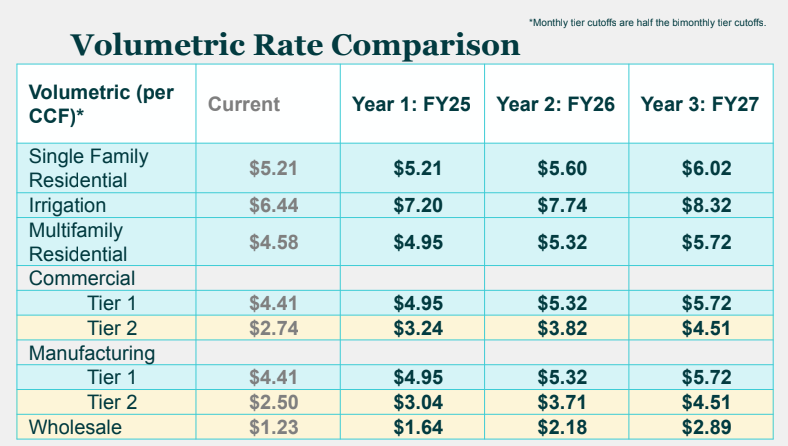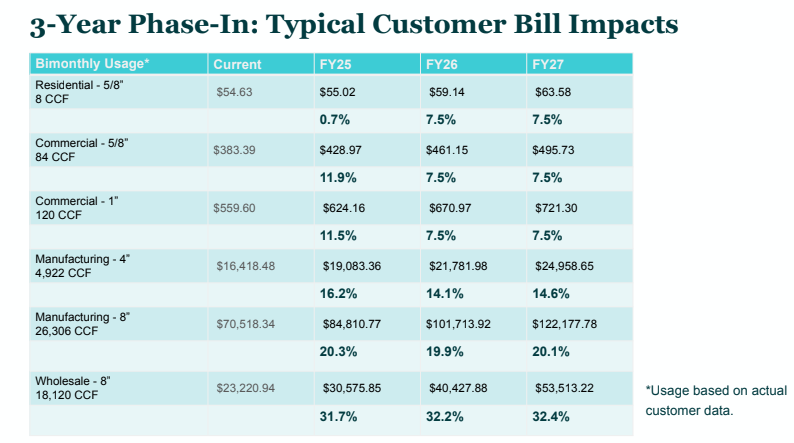Asheville residents have been paying too much for water, city says; Other users face hikes
ASHEVILLE - For years, the city's residential water customers have subsidized its commercial and industrial users, with residential users shouldering a higher cost for the city's water supply than was found to be equitable.
That's according to a new water rate model study from Raftelis, a consulting firm out of Charlotte. It first brought preliminary results to the city's Policy, Finance and HR Committee in September, which confirmed that rates need to be realigned to equitably reflect the cost of providing service.
An updated three-year phase-in model was presented to the committee Feb. 13.
Recommended increases are steep, particularly for wholesale, manufacturing and commercial customers. Wholesale customers could see their bills more than doubling across the next three years. For certain commercial and industrial customers, a typical bill could see hundreds, if not thousands, of dollars in increases.

Why the increase?
The study comes after recent concerns by council members and residents, who noted that the current rate structure presents an imbalance for residential customers versus commercial users, with the latter getting breaks for greater usage, and facing lower rates than those of single family residential.
Water Resources Director David Melton said the gap developed over time. The latest overhaul of the current model was in 2010. A few updates have been made since 2016. With the cost-of-service study in hand, Melton said they are better positioned to began to address the apparent "imbalance."
"When we are looking at rate increases going forward over the next five years, the bulk of those rate increases, the higher rate increases, really need to be on the commercial, manufacturing and wholesale customer classes," said Melissa Levin, executive vice president of Raftelis.
Rate adjustments are needed, Levin said, to fund a $239 million five-year capital program.
Finance Director Tony McDowell said the proposed plan would "eliminate the inequity that currently exists amongst customer classes quicker," would allow an established reserve for funding the capital program, and preserve the city's debt rating.
The five-year capital plan, which spans fiscal year 2025-2029, requires $48 million in annual spending. It will be funded through revenue bonds and cash reserves. Projects include:
Meter replacement project: $28.8 million
Water Treatment Plant rehab project: $12.5 million
Water Treatment Plant treatment enhancements: $75 million
Mills River Expansion Phase III: $40 million
Projects are necessitated by aging infrastructure, Melton said, creating a more resilient system and preparing for future expansion.
"It's not new shiny things," Melton said. "It's us trying to maintain service delivery."
Without rate increases, the study found, total reserve balances and debt service would begin to dwindle, dropping below target goals within several years. In the case of the reserves, it would fall into the negatives by FY 2029.
3-year rate increases
There are two elements to the rate structure: base and volumetric rates.
Recommended increases for base rates, charged per meter size and assessed regardless of water usage, would see no increase this year — aside from the smallest meter size, the 5/8-inch meter, at 3% — and 7.5% increase across all base charges for the two subsequent years.
But the biggest changes would come to the volumetric rates, which is charged per centum cubic feet, about 748 gallons of usage.
Single family residential rates are recommended to remain steady this fiscal year, before a 7.5% increase for both fiscal years 2026 and 2027 — that's an increase from the current rate of $5.21 per CCF to $6.02 across three years.

Of Asheville water system's 60,700 customers, 53,304 are single-family residential customers who are billed for about 2.8 million CCF of the system's total of 7.4 million, or 37.8%, according to the study. The next highest is commercial customers using 33.3%.
For Tier 1 commercial customers, rates would rise from the current rate of $4.41 to $5.72 by fiscal year 2027. For the typical user that's an increase from a $383 bi-monthly bill to $496.
For Tier 2 commercial users, customers with a larger usage, rates would rise from $2.74 to $4.51. For a typical bill, the city said, that's a $560 bi-monthly bill to $721.
Increases look starker for the city's wholesale customers, of which there are only a handful of accounts, including Woodfin Water & Sewerage, the town of Black Mountain and the town of Biltmore Forest.
Levin said fees for wholesale and manufacturing customers have been "historically low."
Across three years, their rates would go from $1.23 per CCF to $2.89. A typical customer bill could increase from $23,221 in the current year to $53,513 in fiscal year 2027.
It's what Levin called a "right-size" for the system.

What's next?
City Manager Debra Campbell said the city is also pursuing other revenue streams, such as federal and state funds.
"But our rates are not keeping pace with the tremendous need that we have," Campbell said. "That's where we have to go first."
No action was requested from the committee in February, but McDowell said staff would return in March with the "full packet" of fees proposed for the next fiscal year, including water.
At that March meeting, the committee, made up of three council members, will vote before recommendations move forward to full council.
More: Asheville water outages, 1 year later: What's been done after thousands went without water
More: Asheville Council OKs water rate increase despite 'greater burden' on residential users
Sarah Honosky is the city government reporter for the Asheville Citizen Times, part of the USA TODAY Network. News Tips? Email shonosky@citizentimes.com or message on Twitter at @slhonosky. Please support local, daily journalism with a subscription to the Citizen Times.
This article originally appeared on Asheville Citizen Times: Steep water rate hikes proposed for Asheville's commercial users

